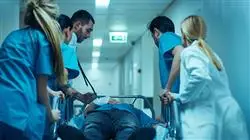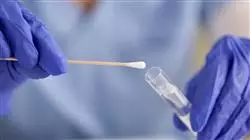University certificate
Scientific endorser

The world's largest faculty of nursing”
Introduction to the Program
A comprehensive and 100% online program, exclusive to TECH, with an international perspective backed by our membership in the National League for Nursing"

The Intensive Care Unit (ICU) is defined by its high complexity, requiring nursing professionals to provide interventions that are not only rapid and precise, but also deeply human. In these critical environments, where every second matters, rigorous and updated clinical knowledge is essential, as well as interpersonal skills that promote comprehensive care for critically ill patients. For this reason, professionals working in ICUs must be prepared to face diverse clinical scenarios and make evidence-based decisions that ensure the safety and stability of critical patients.
In this context, TECH has developed the Advanced master’s degree in Intensive Care Unit Nursing, designed to meet today’s healthcare demands. Throughout the academic journey, participants will study essential topics such as hemodynamic monitoring, ventilatory support, care for polytrauma patients, and the management of cardiovascular emergencies. The program also includes modules on bioethics, critical pharmacology, and emotional support for patients and their families, providing a holistic perspective of nursing practice in the ICU.
Delivered in a 100% online format, the program enables professionals to balance their learning with work and personal responsibilities. Additionally, it employs the innovative Relearning methodology, based on the intelligent reiteration of key content, ensuring deeper and more lasting knowledge acquisition and the immediate application of competencies in clinical practice. Finally, TECH offers access to exclusive Masterclasses led by an International Guest Director, providing a truly global learning experience without leaving home.
As a member of the National League for Nursing (NLN), TECH offers students access to assessment tools, digital libraries, webinars, and conferences focused on nursing educational excellence. This membership promotes faculty development, engagement with leading experts in the field, and the opportunity to join high-impact academic and clinical networks.
Exclusive Masterclasses delivered by an international figure will provide you with fresh perspectives, cutting-edge methodologies, and globally relevant knowledge”
This Advanced master’s degree in Intensive Care Unit Nursing contains the most complete and up-to-date university program on the market. Its most notable features are:
- The development of practical case studies presented by experts in Intensive Care Unit Nursing
- The graphic, schematic, and practical contents with which they are created, provide scientific and practical information on the disciplines that are essential for professional practice
- Practical exercises where the self-assessment process can be carried out to improve learning
- Special emphasis on innovative methodologies in Intensive Care Unit Nursing
- Theoretical lessons, questions to the expert, debate forums on controversial topics, and individual reflection assignments
- Content that is accessible from any fixed or portable device with an Internet connection
Transform your career and elevate your skills to the highest level with a university program that combines advanced theory and clinical practice”
The faculty includes professionals specialized in Intensive Care Unit Nursing, who bring their extensive experience to this program, along with distinguished experts from leading societies and prestigious universities.
The multimedia content, developed with the latest educational technology, will provide the professional with situated and contextual learning, i.e., a simulated environment that will provide an immersive educational experience designed to prepare students for real-life situations.
This program is designed around Problem-Based Learning, whereby the student must try to solve the different professional practice situations that arise throughout the program. For this purpose, the professional will be assisted by an innovative interactive video system created by renowned and experienced experts.
Gain access to elite-level specialization, supported by an international faculty and an innovative, effective learning methodology"

Turn your vocation into a specialization that makes a difference! Benefit from the most effective 100% online learning methodology”
Why study at TECH?
TECH is the world’s largest online university. With an impressive catalog of more than 14,000 university programs available in 11 languages, it is positioned as a leader in employability, with a 99% job placement rate. In addition, it relies on an enormous faculty of more than 6,000 professors of the highest international renown.

Study at the world's largest online university and guarantee your professional success. The future starts at TECH”
The world’s best online university according to FORBES
The prestigious Forbes magazine, specialized in business and finance, has highlighted TECH as “the world's best online university” This is what they have recently stated in an article in their digital edition in which they echo the success story of this institution, “thanks to the academic offer it provides, the selection of its teaching staff, and an innovative learning method aimed at educating the professionals of the future”
A revolutionary study method, a cutting-edge faculty and a practical focus: the key to TECH's success.
The most complete study plans on the university scene
TECH offers the most complete study plans on the university scene, with syllabuses that cover fundamental concepts and, at the same time, the main scientific advances in their specific scientific areas. In addition, these programs are continuously being updated to guarantee students the academic vanguard and the most in-demand professional skills. In this way, the university's qualifications provide its graduates with a significant advantage to propel their careers to success.
TECH offers the most comprehensive and intensive study plans on the current university scene.
A world-class teaching staff
TECH's teaching staff is made up of more than 6,000 professors with the highest international recognition. Professors, researchers and top executives of multinational companies, including Isaiah Covington, performance coach of the Boston Celtics; Magda Romanska, principal investigator at Harvard MetaLAB; Ignacio Wistumba, chairman of the department of translational molecular pathology at MD Anderson Cancer Center; and D.W. Pine, creative director of TIME magazine, among others.
Internationally renowned experts, specialized in different branches of Health, Technology, Communication and Business, form part of the TECH faculty.
A unique learning method
TECH is the first university to use Relearning in all its programs. It is the best online learning methodology, accredited with international teaching quality certifications, provided by prestigious educational agencies. In addition, this disruptive educational model is complemented with the “Case Method”, thereby setting up a unique online teaching strategy. Innovative teaching resources are also implemented, including detailed videos, infographics and interactive summaries.
TECH combines Relearning and the Case Method in all its university programs to guarantee excellent theoretical and practical learning, studying whenever and wherever you want.
The world's largest online university
TECH is the world’s largest online university. We are the largest educational institution, with the best and widest online educational catalog, one hundred percent online and covering the vast majority of areas of knowledge. We offer a large selection of our own degrees and accredited online undergraduate and postgraduate degrees. In total, more than 14,000 university degrees, in eleven different languages, make us the largest educational largest in the world.
TECH has the world's most extensive catalog of academic and official programs, available in more than 11 languages.
Google Premier Partner
The American technology giant has awarded TECH the Google Google Premier Partner badge. This award, which is only available to 3% of the world's companies, highlights the efficient, flexible and tailored experience that this university provides to students. The recognition as a Google Premier Partner not only accredits the maximum rigor, performance and investment in TECH's digital infrastructures, but also places this university as one of the world's leading technology companies.
Google has positioned TECH in the top 3% of the world's most important technology companies by awarding it its Google Premier Partner badge.
The official online university of the NBA
TECH is the official online university of the NBA. Thanks to our agreement with the biggest league in basketball, we offer our students exclusive university programs, as well as a wide variety of educational resources focused on the business of the league and other areas of the sports industry. Each program is made up of a uniquely designed syllabus and features exceptional guest hosts: professionals with a distinguished sports background who will offer their expertise on the most relevant topics.
TECH has been selected by the NBA, the world's top basketball league, as its official online university.
The top-rated university by its students
Students have positioned TECH as the world's top-rated university on the main review websites, with a highest rating of 4.9 out of 5, obtained from more than 1,000 reviews. These results consolidate TECH as the benchmark university institution at an international level, reflecting the excellence and positive impact of its educational model.” reflecting the excellence and positive impact of its educational model.”
TECH is the world’s top-rated university by its students.
Leaders in employability
TECH has managed to become the leading university in employability. 99% of its students obtain jobs in the academic field they have studied, within one year of completing any of the university's programs. A similar number achieve immediate career enhancement. All this thanks to a study methodology that bases its effectiveness on the acquisition of practical skills, which are absolutely necessary for professional development.
99% of TECH graduates find a job within a year of completing their studies.
Advanced Master's Degree's Degree in Intensive Care Unit Nursing
Nursing in the Intensive Care Unit is a highly specialized field that demands advanced technical knowledge and clinical skills to deliver high-quality care to critically ill patients. TECH Global University offers the Advanced Master's Degree in Intensive Care Unit Nursing, a fully online practical training program designed to update and strengthen the competencies of nursing professionals who currently work, or aspire to work, in this demanding healthcare setting.
This program focuses on the development of advanced skills essential for the care of critical patients, including hemodynamic monitoring, mechanical ventilation, airway management, administration of high-risk medications, and the management of teams and resources within the ICU. In addition, it addresses key ethical, legal, and leadership considerations in intensive care nursing. With its practical orientation, the program incorporates clinical cases and real-world scenarios, allowing participants to apply their knowledge directly in their professional practice. By completing this program, nursing professionals will be better equipped to face the challenges of critical care and to provide specialized, high-quality care to patients in intensive settings.







